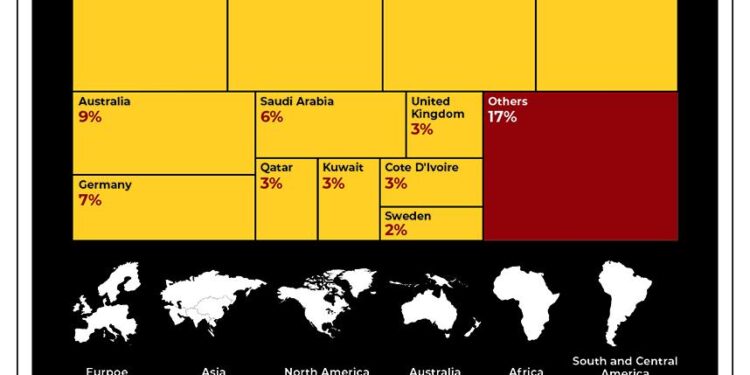As Albania prepares for its upcoming elections, the political landscape is characterized by uncertainty, especially due to the growing meaning of votes from citizens living abroad and the emergence of new political parties. With approximately one million Albanians residing outside their country, their influence on electoral results is becoming increasingly significant. This trend has prompted established political parties to reevaluate their strategies in order to engage this crucial demographic.At the same time, a wave of new political movements is challenging traditional practices, adding further complexity to Albanian politics. As campaigning heats up, both analysts and voters are left pondering the implications of these developments‚ÄĒraising essential questions about representation, accountability, and the future direction of the nation. This article delves into how diaspora voting interacts with emerging parties and its implications for Albania’s democratic framework.
Diaspora Voting Transforms Albanian Electoral Dynamics
The impact of Albanians living abroad on electoral dynamics has become increasingly evident in recent elections. A significant number of expatriates now have access to remote voting‚ÄĒa change that has altered traditional voting patterns and introduced an element of unpredictability into elections. The rise of technology enabling remote participation has empowered these citizens to express their opinions more effectively within Albania‚Äôs political arena. As a result, established parties are modifying their tactics in an effort to connect with voters whose priorities may differ based on their experiences abroad.
Key Factors Driving This Change Include:
- Engagement Initiatives: Political groups are launching programs specifically aimed at connecting with diaspora voters.
- Cultural Bonds: Many expatriate voters maintain strong connections to Albanian culture and values.
- Innovative Policies: New platforms addressing issues such as economic advancement and anti-corruption resonate strongly with those living overseas.
The rise of new political entities adds further complexity when predicting voter turnout and preferences within Albania’s changing electoral landscape. These fresh factions often appeal directly to younger generations as well as those influenced by life outside Albania‚ÄĒresulting in a fragmented political surroundings that disrupts traditional power dynamics. Creative campaign strategies combined with grassroots efforts have allowed these newcomers to gain traction against established players.
| Voter Demographic | Tendency |
|---|---|
| Diaspora Voters | Tend towards progressive parties prioritizing transparency. |
Emergent Political Parties Add Complexity to Elections
The emergence of new political factions in Albania introduces additional layers amid rising dissatisfaction with conventional power structures. These groups frequently enough focus on critical issues such as economic reform, anti-corruption measures, and social justice‚ÄĒattracting support from a diverse electorate eager for change. Particularly among younger voters and members from the diaspora community seeking alternatives, this proliferation creates numerous options that can lead not only to vote fragmentation but also unpredictable election outcomes.
This increasing complexity reflects shifting public sentiments while posing challenges for traditional parties striving for relevance amidst evolving dynamics.
The historical role played by Albanians abroad cannot be overlooked; they have long been instrumental through their voting capabilities during elections. As newer parties emerge alongside existing ones vying for attention from this demographic group‚ÄĒthe potential influence could significantly alter electoral outcomes if effectively mobilized.
A few key elements likely shaping future results include:
- Electoral Positioning: How emerging factions present themselves appealingly toward both local constituents as well as expatriates;
- Coalition Opportunities: The likelihood that alliances form between novel entrants alongside traditional establishments;
- Inevitably Relevant Policies:The clarity surrounding issues raised by newcomers compared against longstanding party platforms will matter greatly moving forward;
| New Political Entity | Primary Focus | Potential Impact | |||||
|---|---|---|---|---|---|---|---|
| Progressive Coalition < | Social Equity & Justice >< << | Strong appeal among youth & urban demographics >< << | |||||
| Green Party >< << | Environmental Advocacy >< <<>Attracts eco-conscious citizens >> >>>/ tr > >>> | ||||||
| Engagement Approach | Action Item | ||
|---|---|---|---|
| ‘Digital Outreach” | ‘Launch interactive website offering updates” ‘/ tr’ | ||
| ‘Educational Initiatives” | ‘Conduct webinars explaining voting procedures” ‘/ tr’ | ||
















